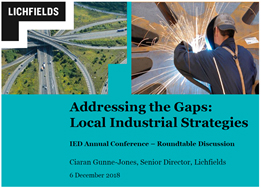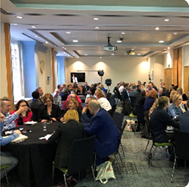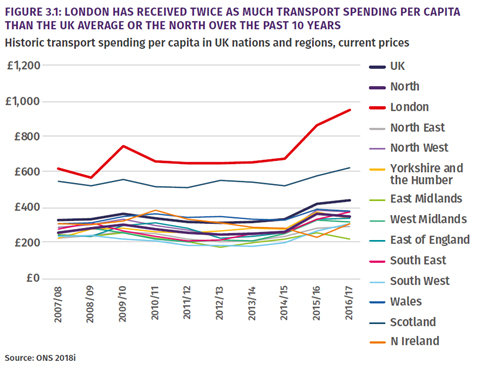The Institute of Economic Development (IED) Conference was held in London on the 6th December last year, its focus was 'productivity, place and people'. This blog reflects on the themes of the Conference, with a particular focus on the challenges facing the North.
Productivity
The conference was timely in that it came the day after the Institute of Public Policy and Research (IPPR) published their annual 'State of the North 2018' report which sets out a number of key challenges for the North. The Report highlighted that the original Northern Powerhouse agenda focused on productivity. New investment was considered to be a positive outcome as it was anticipated that this investment would automatically result in benefits to all communities. The reality has not quite replicated this hypothesis.
Strategic Economic Plans (SEPs) and Local Industrial Strategies (LISs) have a key role to play in identifying the key sectors which are central to driving increased local productivity. LISs was the focus of the session facilitated by Lichfields at the Conference, to which there was considerable interest from practitioners across the country beginning to consider how a LIS may look for their area.


The relationship between a SEP and LIS will vary from location to location but emerging guidance suggests that LISs will focus on key sectors which will drive productivity. However, there are enabling sectors such as logistics and construction which will have a key role in facilitating increased productivity in key sectors rather than being a key sector themselves. It is expected that these enabling sectors which facilitate growth, will help to increase participation potentially for lower skilled jobs which would complement the growth in higher skilled employment. Increasing participation is aligned with inclusive growth and ensuring economic success is felt across communities and ensuring all communities can benefit from increased productivity.
There were positives from the Conference, particularly the opportunities provided by Innovate UK in terms of the UK being a leader in Artificial Intelligence and other emerging highly specialised sectors of growth, and Homes England's drive to boost housing delivery in areas affected by significant affordability constraints.
People
The IPPR report focuses on the need for northern leaders to ensure, in the future, that they start to monitor health and well-being and the impact this has on productivity and inclusive growth. The opening panel discussion at the IED Conference focused on what makes a successful place and health and well-being were highlighted as being central to this. Given the disparity in life-expectancy between parts of the North and South of England tackling this should clearly be a priority. This links to the IPPR report highlighting the need to ensure that going forward the Northern Powerhouse agenda must expand across the North and move away from solely focussing on the major city regions. This will be important to ensure that growth is inclusive and a range of different communities will contribute to the region's economy and the goal of increased productivity.
There are some stark indicators that more needs to be done to ensure growth is effectively inclusive; a quarter of northern workers - 1.6 million people- are paid below the real living wage (a wage which enables households to have an acceptable standard of living) and weekly pay has fallen by £21 since 2008 in real terms. (
https://www.ippr.org/research/publications/state-of-the-north-2018).
Devolution provides important opportunities to align approaches rather than fragmentation. Beyond the development of LISs, there are challenges to ensure that Local Enterprise Partnerships (LEPs) and Combined Authorities work alongside key employers and education providers to ensure that local people moving out of education and into the workplace have the skills required to meet employers’ needs. Tackling the lack of participation in the workforce is an important component of achieving increased productivity, improving skills is critical to success.
In the North East, both of the existing LEPs (Tees Valley and the North East) are acutely aware of the need to ensure that historic trends in lack of participation and low aspirations are tackled from a young age. Both LEPs are working with schools across their LEP areas to help drive-up educational attainment and reduce the gap between the worst and best performing schools.
Place
The IPPR report set out a number of key challenges not least the disparities of per capita spending on transport in the North compared to the south of England, and the overall impact of austerity policies, which has hit the North more than any other region. An efficient, well-connected and affordable transport network has a key role to play in facilitating economic growth through connecting places and improving accessibility of people to jobs and economic opportunities.
Figure 1 Transport Investment Comparison

Source: 'State of the North 2018' IPPR
Creating a successful and competitive economy in the North East will also positively impact on graduate retention, in the medium to long term, and stem the flow of highly skilled professionals from the region. The North East has so many attractive qualities such as proximity to the coast and countryside, historic cities and vibrant urban centres which are often under-valued by new graduates because of the lack of perceived opportunities for employment in key sectors. Providing the right choice of homes in the right places in the North East is also critical to supporting economic opportunities.
The Conference highlighted the future challenges in ensuring the UK can increase productivity, and ensure improvements are spread across all regions. The potential economic implications of Brexit and how this may impact on productivity, place and people were also reflected on throughout the day, particularly the impact Brexit is likely to have in the regions where there are lower levels of productivity. For the North the challenge is not only supporting key sectors to grow but also ensuring the growth of highly skilled jobs is supported by increased participation, by getting people currently out of work back into work, and by addressing fundamental inequalities to ensure productivity is experienced across all communities.
We are about to embark on a new LIS for Tees Valley. If you would like to know more about this and how we can help you through this journey, take a look at our
product or get in touch with
Ciaran Gunne-Jones,
Lucie Bailey or
Ross Lillico.







